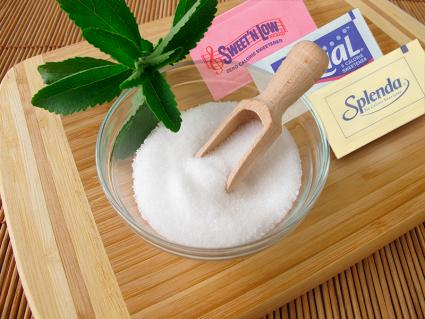Artificial sweeteners and other sugar substitutes are found in many foods and beverages marketed as “sugar-free” or “diet.” But what exactly are all these sweeteners and how do they affect your body? The truth is, zero-calorie sweeteners aren’t the best choice. They are processed, synthetic, and contain fillers. Additionally, they can cause digestive issues and negatively affect your gut biome. And, believe it or not, consumption of artificial sweeteners has been linked to weight gain. Let’s start with a quick lesson I’ll call “Sweeteners 101”…
When it comes to sweetening our food, we have sugar, natural sweeteners, artificial sweeteners, and sugar alcohols. We’ve all heard about the risks associated with eating too much sugar and natural sweeteners like cane juice, honey, or syrups, so I will save that rant for another day. Even though Stevia is labeled as a natural sweetener, it often has additives and has the same effect on the brain as all the sweeteners mentioned today. Artificial sweeteners, including aspartame and sucralose, are synthetic sugar substitutes and are hundreds of times sweeter than sugar. And lastly, sugar alcohols, like erythritol, xylitol, and mannitol, aren’t really digested which can lead to gas, bloating, diarrhea, and other GI issues.
Consuming sweet-tasting but noncaloric or reduced-calorie food and beverages interferes with learned responses that normally contribute to glucose and energy homeostasis. Our brain responds to food just like it would respond to activities that bring us extreme pleasure. There are two branches of our food reward system: sensory and postingestive. Evidence suggests that non-caloric sweeteners don’t activate the food reward pathways the same as natural sweeteners. Having no calories eliminates the postingestive component. With a failure to activate this postingestive component, our brains lack complete satisfaction. This signals food seeking behavior and can lead to obesity and all the chronic diseases that come with. Because artificial sweeteners are so sweet, they encourage increased sugar craving and dependence.

It’s a tough ask for me to tell you to stop eating sweets, but there is good news! Repeated exposure to certain flavors like sweet or salty trains your flavor preferences and this can be used in our favor. Slowly reducing these flavors in your diet can free you of their influence and cravings.
Remember, processed foods containing these sugar substitutes don’t offer the same health benefits as whole foods, such as fruits and vegetables.
Resources:

